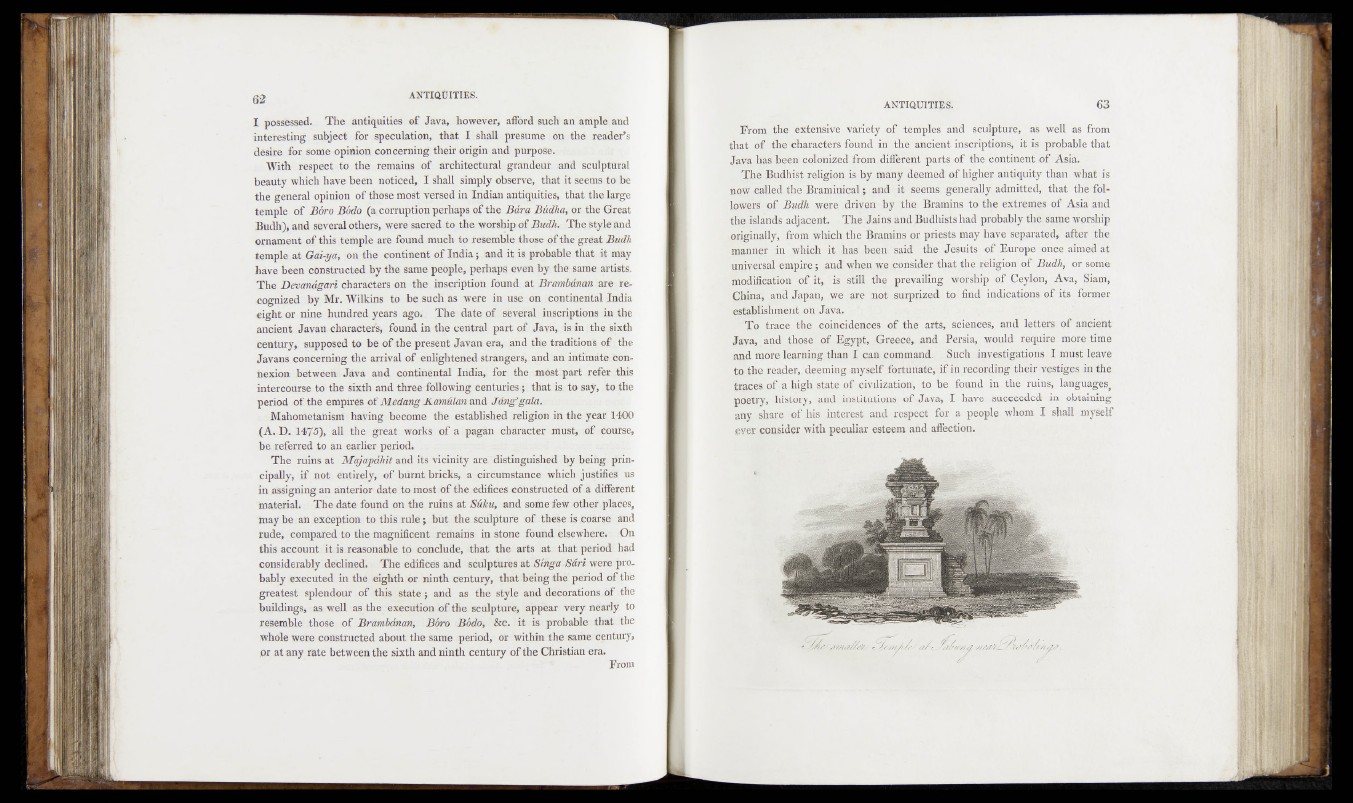
m ANTIQfilTIES.
1 possessed. The antiquities of Java, however, afford such an ample and
foi-grirefttwg subject for speculation, that I shall; presume on the realder’s
desire for Some opinion concerning their origin and purpose.
_ With respéct to the remains of architectural grandeur and sculptural
beauty which have heen noticed, I shall simply observe, that it seems, to be
the general opinion of those most versed in Indian antiquities, that tl^gffilge
temple of Bóro Budo (as corruption perhaps of the Bar# Büdha, or the Great
Budh), and Several Others, were sacred to the worship óf Budk. The Style and
ornament of this temple are found much to resemble those Of the great Budh
temple at Gai-ya, outhe continent of India; and it is probable that it way
have been constructed by the same people, perhaps even by^è; same artists.
The Devandgari characters on the inscription found, at Brambtinm are re?-
-cognized by Mr. Wilkins to be sueh as wete in;use. ondcóntitieniai India
#>ght or nine hundred years ago. The. date of..sèveral..inscriptions in the
ancient Javan, characters, found in the eentrfel part of Java, is in the sixth
century, supposed to be of the present Javan era, and the traditions of; the
Javans contenting the arrival of enlightened Strangers, and an intimate connexion
between Java and continental India,. forthe móst. part .refer .this
intercourse to the sixth and three following centuries;} , that is;.to say, to the
period of the empires of Medang Kamulan and Jdmg’gala..
Mahometanism having become the established Religion ih the year 1400
.(Ai ©i.Séf'f), all the great works of a paghn ehdractel must,. .Of course,
be referred to an earlier period.
The ruins at Mcgapdhit and its vicinity areTdistingirishgd byihfeihg; frin-
cipally, if not entirely, of btirnt bricks, a circumstance which justifies us
in resigning an anterior date to most öf fhe.edifices cóhstruGtèd offi different
material.; The date found on the ruins at Séhu, and some few; other places,
may be . an exception to this rule; but the sculpture of. these is Coarse and
fcude, compared to the magnificent remains in stone foundèlsewhere, :On
this account it is reasonable to conclude, that the arts at that period had
considerably declined'. The edifices and sculptures at Sittga.Suri were pro.
bably executed in the eighth or ninth century, that.being thé period ofithe
greatest splendour o f this state} and as the style and decorations. Of the
buildings, as well as the execution o f the sculpture, appear very nearly to
resemble those of Jframbénan, Bóro Bódo, &c.j it is probable that the
whole were constructed about the same period, or within the same century,
.Or at any fate between the sixth and ninth century of the Christian era.
Trom
Trom tlie extensive variety of* temples and sculpture, as well as from
that of^,lthe''4charactersn^nnd irfj thW-antifent' inscriptions; it'is probable that
Java h^jheenvcotonizpd fiomidifferent .pants jo£ the continent M Asia.
The Budhi^k religion- is by many deemed o f .higher antiquity than what is
now -cabled the Braminical; and it seems;genofab^admitted, that the followers
of Bu<$i were, driven ;hy, "the Bramins to the extremes of Asia and
the islands adjac.egjt. The Jains andBudhists had probably the same worship
Originally,liffopi jwhich the Bramins of priests maydiaye ’separated/ aften;the.
-manner in which it lias been;’said the Jesuits [ofi'^uope^onGe;aimed at
universal empire; and'whmws consider that tb4.xbligion bf.Budh, or soma
.modification "tiJsstill the prevailing ^qphip oJ iCeyJpn, i^Ava, Siam,
China, ancl Japan, ,we are not surprized tp> find indications of its former
0Sf«mshment>on Java,-; ’
To trace the coincidences of the arts, sciences, and letters:.^ ancient
Java, and 4 those‘^ f Egypt, „-Greece, and Persia, would ,^eifexmore^Kme
anti mofe learning than I can command. , Such. investigations I must leave
toj|.be.reader, deeming -myself fortunate, if ip^re&ofdin^t-heir-vestiges, in the
traces of a high state of.civilization, to beiJoupd in, the. rntnS, languages;
poetry, history, an’d institutions4 .ofkJava,1-I; have ►succeeded in. obtaining
any .share, ^of his interest and respect for a people whom I shall myself
ever consider with peculiar esteem and affection.